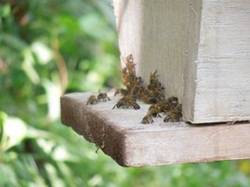Promoting bee-keeping

Bees produce honey, a source of income
For the small holder farmers living in Kilimanjaro Region, bee-keeping is an attractive source of additional source of income besides their agricultural and livestock-keeping activities. Honey is a product that is valued in Tanzania for its medicinal value and as nutritious food. Furthermore, bee colonies are crucial for the cross-pollination of banana, cereals and legumes. Therefore, KIHO is promoting bee-hives as a means for improved farming as well as an income-generating opportunity as "honey is money".
In order to improve the inefficient and dangerous current practice of "traditional" bee-keeping, KIHO promotes "modern" bee-hives as well as bee houses. These practices allow to harvest honey more frequently, with a higher output and it has less impact on the bee colony. Such methods prevent the expulsion of bees from the hive, keep the honey combs intact and thus make it possible to increase the bee population as well as the production of honey.
We strive to implement these new technologies and to introduce other products gained from bees, for example bee wax and royal gelly.
Successes:
Our aim:
In the long run, we aim to install a training center where we can coordinate and conduct practical and theoretical training of bee-keeping for the local farmers.
In order to improve the inefficient and dangerous current practice of "traditional" bee-keeping, KIHO promotes "modern" bee-hives as well as bee houses. These practices allow to harvest honey more frequently, with a higher output and it has less impact on the bee colony. Such methods prevent the expulsion of bees from the hive, keep the honey combs intact and thus make it possible to increase the bee population as well as the production of honey.
We strive to implement these new technologies and to introduce other products gained from bees, for example bee wax and royal gelly.
Successes:
- Support of three bee-keeping groups (Ruvu, Tae and Vumari)
- Facilitation of 90 "modern" bee-hives together with Tanzania Social Action Fund to UWAVU
- Setting up UWAMA, a Maasai-led beekeeping group that is currently integrated in UWAVU. Among the 20 group members, the majority are women. The support of UWAMA will hopefully reduce the tension between livestock-keepers and farmers.
Our aim:
In the long run, we aim to install a training center where we can coordinate and conduct practical and theoretical training of bee-keeping for the local farmers.
